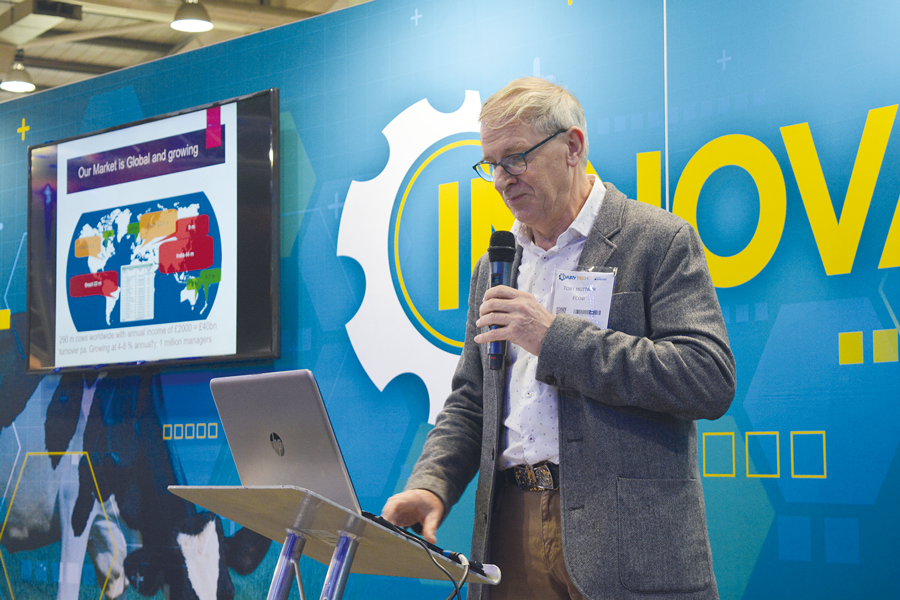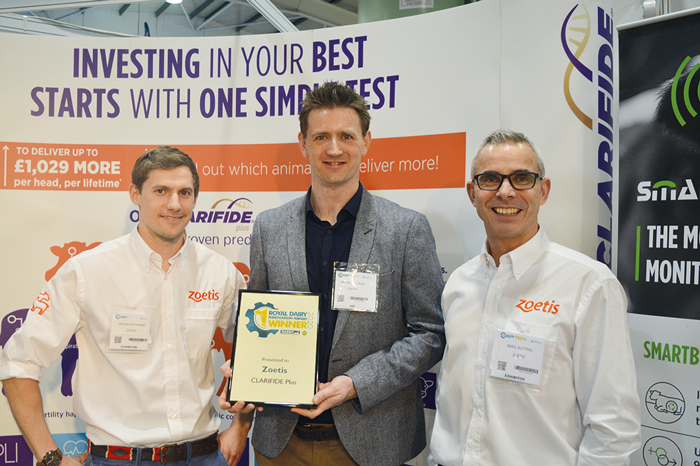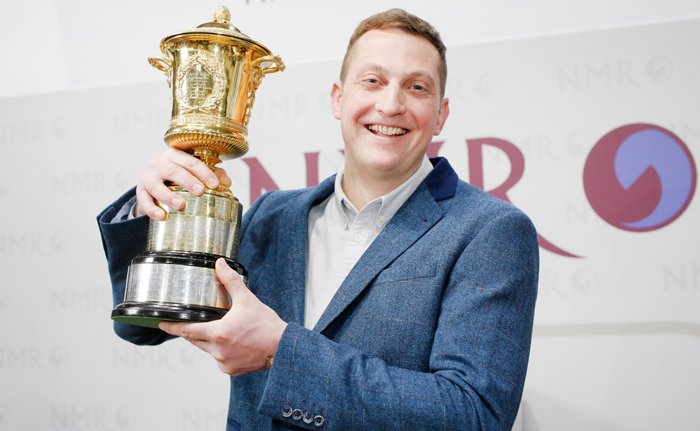The future is bright for dairy
13th March 2020
Conversations at this year’s Dairy-Tech were inevitably dominated by climate change but, while it is clear the industry will undergo significant changes in the next 10–20 years, there is no shortage of innovation and skill to help producers meet the challenges ahead. Sarah Kidby attended.
Conversations at this year’s Dairy-Tech were inevitably dominated by climate change but, while it is clear the industry will undergo significant changes in the next 10–20 years, there is no shortage of innovation and skill to help producers meet the challenges ahead. Sarah Kidby attended.

Professor Toby Mottram, founder of agri-tech start-up Milkalyser, believes robotics and sensors will become more commonplace.
Speakers in both the dairy and innovation hubs at this year’s show, which took place in early February, were keen to stress that farmers should not be phased by vegan trends and ‘dairy bashing’ in the media, but emphasised that reducing environmental impacts will be key. With more than 55 product launches and nearly 80 speakers, there was a strong focus on how technology such as robotics, sensing, satellite mapping and genomics, will become increasingly important in helping farmers to produce more, with less.
Professor Toby Mottram, who founded the agri-tech start-up Milkalyser, said he believes we could one day see a ‘Fitbit for cows’ or a low-cost sensor for measuring emissions. He predicts that robotics and sensors for animal health and feed efficiency will become more commonplace, with monitoring dry cows being a possible new focus area. The technology behind a system for measuring in-line progesterone levels, developed by Milkalyser, could also be adapted to detect disease markers for BVD, Johne’s, and possibly even bovine TB, he added.
Meanwhile, Cogent genetics manager Andrew Holliday said the company believes feed efficiency is the key to producing more food with fewer inputs. Trials of Cogent’s EcoFeed in Ohio have revealed that heifers on the diet eat up to 24 per cent (4.7kg) less feed a day.
Exploring what British dairy could look like in the next 10 years, dairy consultant John Allen, of Kite Consulting, predicted that farm numbers will shrink to just under 8,000, while average yield per cow will rise from 8,090 litres per cow to more than 11,080. Alternatively, he mused, it is possible that milk outputs will actually increase so the surplus can be exported. A new report, ‘A Vision for Dairy 2030’, released by Kite during the show, predicts environmental issues will be the biggest threat to dairy farming, but states that the industry can reduce emissions by 30 per cent in the next decade. Technology and better use of nitrogen will be an important part of this, John said, while consultant Duncan Williams added that using genomics to improve feed efficiency, health and productivity, will also be key.
Dairy innovations
Zoetis took home this year’s Royal Dairy Innovation Award for its unique genomic test, Clarifide Plus. Arriving in the UK in 2019, it is the only genomic test to incorporate health and wellness traits, as well as production traits. Judges were impressed by the way the selection of animals now encompasses the Dairy Wellness Profit Index, which is adding health traits. Head of judges Tim Downes said: “It’s very exciting that animals twice as healthy can be chosen – improving lifetime productivity alongside less disease incidence.”

Zoetis’s Josh Batterham, Phil Cullinan and Nigel Bottrill after winning
the Royal Dairy Innovation Award for Clarifide Plus.
Runners up for the award were Miracle Tech with its cattle weighing app Beefie; and Herdwatch, which introduced the next generation version of its app for completing paperwork in the field.
Other innovative products launched at the show included Rezatec’s Grass SAT, a new digital grass management tool for optimising grazing performance; the Unique teat spray dip from EnviroSystems, which early adopters say has significantly reduced somatic cell counts; and new software from Mole Valley Farmers that can predict the amount of methane produced by different rations.
Gold Cup goes to Ayrshire farmers
The Sloan family from Auchinleck, Ayrshire, are the latest recipients of the NMR RABDF Gold Cup. Robert Sloan runs the 180-cow Townlaw Holstein herd at Darnlaw Farm, alongside the 60-cow Darnlaw Jersey herd, with his parents Bryce and Anne, and his wife Emma. In 2011, they made the decision to switch to robotic milking in a purpose-built shed on a greenfield site at the farm.
RABDF chairman and competition judge said the family had worked together to develop their dairy herds and establish a good working relationship with the milk buyer. “They have invested well in technology and systems and their flexible approach to staffing ensures a good work-life balance,” he added.

Ayrshire farmer Robert Sloan with the NMR RABDF Gold Cup.
© Tim Scrivener Agricultural Photography
